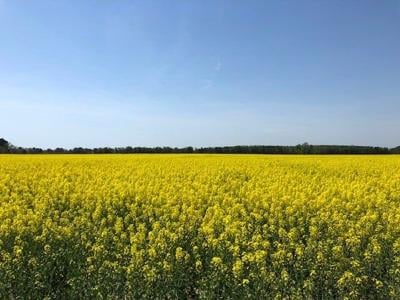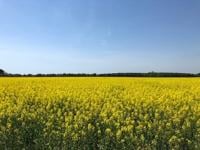By Steve Hammond
PARKSLEY, Va.- Just a stone's throw from the ocean and bay in Parksley, Virginia, is another sea: a sea of yellow that seems almost heavenly.
Stretching for hundreds of acres, it is a beautiful flower with a beautiful scent. It's name, however, is not so beautiful: rapeseed. It is a crop that's been around for hundreds of years, but is just now making its way onto Delmarva as a winter crop after the corn harvest.
Farmer Sands Gayle is a huge fan of rapeseed. Up until last year he had been growing wheat on his Parksley farmland.
"Honestly I had to change, I had to adapt with the times," he said. "And if you're a farmer, change is a good thing these days and trying to figure out and find new atmospheres and new things to get into to try and make more money."
And by cover crop standards, these gold fields mean more green.
"It's simple- you run your numbers before you grow wheat and you run your numbers before you grow rapeseed, and the profit potential was a whole lot more on rapeseed than it was with wheat," Gayle said.
Gayle said he calculated he could make approximately $100 more per acre growing rapeseed than wheat. He started with 250 acres last year, then doubled it to 500 this season. He may double it again next season.
So what is rapeseed? It is a cousin of canola oil. But rapeseed oil has a higher fatty acid content and is not used for cooking. The seeds are crushed into an oil that is used as a lubricant in a variety of ways. For consumers, it makes your bottle caps easier to open. That same thing goes for those plastic bags at the grocery store. Plastic wrap is also easier to manage after being coated with rapeseed oil.
At the industrial level rapeseed oil is used as a lubricant in the engines of big ships. And there is plenty more potential uses for the plant. Experts estimate that 90 percent of rapeseed oil in the U.S. is imported.
Gayle grows his rapeseed for the specialty crop division of Perdue Farms, which crushes the seed and then sells off the oil and leftover meal.
Gayle explained how the growing process works.
"It will actually drop flower and then it'll start growing these ginormous seed pods," he said. "And actually if you go through when the field is dry and you shake 'em you'll hear the seeds inside the pods, it sounds almost like a rattlesnake."
While planting and harvesting rapeseed poses some challenges and can be tough on equipment, Gayle says it's good for the farmland and nearby waterways.
"It's got a deep root and it holds the soil together and it doesn't allow water runoff into the ocean or bay," he said. "It's a cover crop that you're getting paid for."
And right after the late May/early June harvest, Gayle will plant his soybeans. Hs rotation is set: three different crops on his fields every 14 months. In the meantime, he's predicting rapeseed's popularity on Delmarva will grow, and not just with farmers...
"I think that if we can get this grown on the Eastern Shore of Virginia, you'll see passersby...the sides of the roads will be parking lots because people will be stopping and taking in the smells and taking in the picture opportunities."



